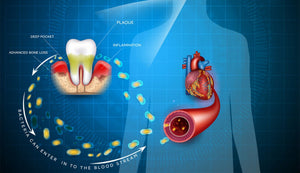It starts subtly. Maybe while brushing, maybe in the middle of a meal - that odd, tingling “cotton-like” feeling in your gums. You poke at them with your tongue. They feel… off. You ask yourself: Why are my gums numb?
Although you may not want to call this sensation an emergency, it is still something that you should not overlook at all. Numb gums may be benign (such as following dental anesthesia) or they might be an early indication of an underlying issue - perhaps infection or nerve issue. The first step in safeguarding your gums is to know the reason why your teeth and gums become numb.
Quick Answer: Why Are My Gums Numb?
Gum numbness can stem from a range of issues; some temporary, others requiring immediate dental attention.
Here’s a quick breakdown:
|
Possible Cause |
Symptoms |
Severity |
What to Do Next |
|
Nerve damage |
Tingling or total loss of feeling |
Moderate–High |
See dentist or oral surgeon immediately |
|
Gum infection |
Swelling, bleeding, bad breath |
High |
Professional cleaning & antibiotics if needed |
|
Allergic reaction |
Swelling, itchiness |
Low–Moderate |
Rinse mouth, avoid allergen |
|
Dental work aftermath |
Temporary numbness |
Low |
Monitor; sensation returns in hours |
|
Vitamin deficiencies |
Fatigue, mouth ulcers |
Moderate |
Adjust diet or take supplements |
When Gum Numbness is Harmless
Not every case of gum numbness means trouble - sometimes it’s just your mouth’s way of saying, “Relax, I’ve got this.”

After Dental Anesthesia
Recent fillings, root canal, and extractions may also show some of the signs, with numb gums following anesthetic treatments that can take a few hours to subside. This is quite normal and is part of healing. The sensation usually appears back slowly throughout the day, although a tingling sensation may stick around slightly longer depending on the dose, and where the injection was applied.
Mild Irritation from Flossing or Dental Tools
Flossing too hard; the flossing where you almost want to start sword fighting with your gums - causes temporary tenderness or numbness. Similarly, instruments applied to the teeth during cleanings occasionally touch the tissue briefly interfering with sensation.
Reaction to Hot or Cold Foods
Drastic changes in temperature such as when one bites into ice cream immediately after taking a hot cup of tea, shocks the gums. This heat stress tends to be short lived, and feeling comes back within a brief period.
Minor Allergic Reactions
There are cases when a new toothpaste, mouthwash, or whitening strip can cause a slight allergic reaction momentarily numbing the gums. By all means, if you suspect this, exchange products and check whether the feeling becomes better.
When Gum Numbness Could Signal Something Serious
In the majority of cases there is nothing to panic about when it comes to gum numbness. Yet, there are cases when it is your body that raises a red flag. A lot depends upon whether the numbness persists or gets worse, or whether some additional symptoms accompany -such as pain, swelling, or any bleeding. If the latter is the case, it could be possible that you are in the presence of something that does not need waiting and immediate action (treatment).

Nerve Damage
Your gums are laced with tiny nerves that connect to larger branches in your jaw. Dental trauma; like biting down hard on something, jaw injuries, or complications from surgery - can bruise, stretch, or even sever these nerves. The result? That strange lack of feeling.
While some nerve injuries heal in weeks, others may be permanent without early intervention. If your gums are numb and the feeling spreads to your lips, chin, or tongue, it’s worth calling your dentist sooner rather than later.
Infections That Spread
A deep-seated gum infection isn’t just about swelling and tenderness - it can also creep into the tissue around nerves. When bacteria get close enough, they can trigger inflammation that compresses or irritates these delicate structures. The early stages might feel like dull tingling, but over time, you could lose sensation altogether in that area. Periodontal disease, abscesses, and severe gingivitis are all common offenders.
Autoimmune and Neurological Disorders
Sometimes the cause isn’t in your mouth at all. Conditions like multiple sclerosis (MS) or lupus can mess with nerve signals, causing gum numbness among other symptoms. These conditions are more complicated because the numbness can come and go, making it easy to ignore until other health issues appear.
Vitamin and Mineral Deficiencies
Your nervous system needs certain nutrients, especially B12, folate, and iron - to function properly. When you’re deficient, nerve signals can slow down, and numbness in areas like your gums might be one of the earliest clues.
This isn’t just about what you eat; digestive problems that affect absorption can be just as guilty.
If your gums are numb and you can’t link it to a dental procedure or a one-off irritation, treat it like you would a warning light on your car dashboard. It doesn’t mean disaster, but it does mean you need a professional to check under the hood.
Infections That Cause Gums to Go Numb
Bacterial infections inside your mouth can do more than make your gums sore; they can interfere with the nerves that give you sensation. Once inflammation sets in, it can put pressure on these nerves, leading to that strange numb or tingling feeling. The longer the infection goes untreated, the more likely it is to cause lasting damage.
Here are the main culprits:
Gum Abscess
Gum abscess is a collection of pus occurring in the gums because of bacterial infection. It is kind of a small balloon packed with bacteria and inflammatory fluid. The swelling may exert pressure on other nerves triggering sharp pains or throbbing - resulting in numbing of the gums as well.
Severe Gingivitis
The first phase of gum disease is known as gingivitis, which involves red, swollen, and very easy to bleed gums. Although gingivitis itself does not tend to make the gums numb, severe or unchecked gingivitis may irritate the deeper tissues and cause an effect on sensitivity.
Periodontal Disease
It is the severe level of gum diseases when inflammation extends not only beyond gums but also to the bone and supportive tissues of teeth. Periodontal disease may involve major nerve implications and thus gums will have numb spots.
Tooth Abscess
A tooth abscess is an infection inside the tooth or at the root, often caused by untreated cavities or cracks. The infection can spread through the jawbone and irritate the nerves that also serve your gums, resulting in numbness.
Why This Matters
Infections aren’t just a local problem. The bacteria can enter your bloodstream, affecting other parts of your body. That’s why even “mild” gum numbness paired with signs of infection (swelling, pus, bad breath) deserves immediate attention from a dentist.
Periodontal Disease Could Be the Culprit
If you’ve been wondering “why are my gums numb” and also notice bleeding, swelling, or bad breath, periodontal disease may be behind it.

What is Periodontal Disease?
Gum disease (also called periodontal disease) is a progressive inflammatory disease of the gums and the support around the teeth. It starts out as gingivitis - a mild inflammation of the gums and may progress to periodontitis, which involves the lower tissues and bone.
How It Leads to Numb Gums
Chronic inflammation damages the nerves in your gums. As bacteria burrow deeper and plaque hardens into tartar, the infection destroys the tissue that keeps gums healthy. In advanced stages, nerve damage can cause partial or complete loss of sensation in affected areas.
Recognizing the Symptoms
While numbness is one sign, periodontal disease often brings a collection of symptoms that build up over time. Understanding them individually can help you catch the condition early.
1. Bleeding Gums
If your gums bleed when you brush or floss, it’s not “normal” - it’s a sign of inflammation. Bleeding means your gum tissue is fragile and inflamed, and bacteria are irritating the area.
2. Swollen or Tender Gums
Swelling is your body’s defense mechanism against infection, but it also means bacteria are thriving in your gum pockets. Tenderness often follows, making chewing uncomfortable.
3. Gum Recession
When gums pull back from your teeth, more of the tooth (and sometimes the root) becomes exposed. This not only changes your smile but makes teeth more sensitive to hot, cold, and sweet foods.
Persistent Bad Breath
Chronic bad breath, or halitosis, isn’t always from what you ate. In gum disease, it’s caused by sulfur-producing bacteria in deep pockets around the teeth.
Loose Teeth
As the infection destroys supporting bone, teeth can shift or feel loose. This stage is a dental emergency - without treatment, tooth loss is inevitable.
Numbness or Tingling
In later stages, inflammation and bone loss can put direct pressure on the nerves that serve your gums, reducing sensation. This is when the symptom “why are my gums numb” becomes a direct clue to advanced disease.
Who’s at Risk?
- Smokers.
- People with uncontrolled diabetes.
- Individuals with poor oral hygiene.
- Those with high stress levels.
- People with a family history of gum disease.
The Silent Progression
One of the most dangerous things about periodontal disease is its stealth. You might not feel pain until significant damage has occurred. By the time numbness sets in, gum tissue and bone support could already be compromised.
The Goodbye Company Gum Disease - A Natural Ally
If you’re dealing with bleeding gums, sensitivity, or early gum disease symptoms, introducing The Goodbye Company Gum Disease into your daily oral care routine could make a real difference. This all-natural preventative solution is infused with Omega 3 and 9 oils, neem, and clove essential oils - ingredients known for their anti-inflammatory and antibacterial properties.
Not only can it help prevent gingivitis from advancing, but it may also assist in managing existing gum problems naturally. Think of it as your daily shield against the progression of periodontal disease, and the numbness it can cause.
Treatment for Periodontal Disease
- Professional Care: Scaling and root planing, laser therapy, or surgery in severe cases.
- Home Care: Brushing twice daily with a soft-bristled toothbrush, daily flossing, and using a gum-friendly mouth rinse.
- Natural Support: Products like The Goodbye Company Gum Disease can be part of a comprehensive oral care plan, supporting gum healing and preventing bacterial buildup.
Other Dental Causes
Sometimes, gum numbness isn’t about infection at all.
- Dental Abscess: Deep infection at the root of a tooth causing swelling and nerve irritation.
- Poor-Fitting Dentures: Pressure points can cause localized numbness
- Impacted Wisdom Teeth: Can press on nerves, causing tingling in gums and jaw.
Non-Dental Causes of Gum Numbness
While dental issues are often the first suspects when gums lose sensation, the root cause isn’t always hiding in your mouth. Sometimes, gum numbness points to bigger systemic concerns - conditions that may affect your nerves, circulation, or overall health.
Nerve Damage and Neuropathy
Your gums rely on a healthy network of nerves to register sensations like pressure, temperature, and pain. When those nerves are damaged, as in peripheral neuropathy, sensations can weaken or disappear. Neuropathy can stem from diabetes, vitamin B12 deficiency, multiple sclerosis, or even long-term alcohol misuse. If gum numbness is paired with tingling, burning, or weakness in other areas of your face or body, nerve involvement should be investigated.
Poor Blood Circulation
Healthy gums need a steady blood supply to function and stay pink and firm. Conditions like peripheral artery disease (PAD) or severe anemia can limit oxygen delivery to gum tissues, leading to pale, cool, or numb sensations. Smokers, in particular, are at higher risk of circulation issues that may show up in oral tissues before anywhere else.
Autoimmune Disorders
Diseases like lupus, Sjögren’s syndrome, or multiple sclerosis can interfere with nerve signals or cause inflammation in gum tissues. For example, Sjögren’s is known for extreme dry mouth, which can irritate nerves and make your gums feel oddly numb or tingling.
Medication Side Effects
Some prescription drugs—especially chemotherapy agents, high blood pressure medications, or certain antidepressants—can cause nerve irritation or alter sensation. If your gum numbness began soon after starting a new medication, that’s worth noting to your doctor or dentist.
Bottom line: If your gums are numb and your dentist can’t find a local cause, it’s time to look at your overall health. Sometimes your mouth is the first place a bigger health issue leaves its calling card.
How Dentists Diagnose Gum Numbness
Expect:
- Oral exam to check gum health.
- Probing for gum pocket depth
- Dental X-rays to assess bone loss.
- Possible blood tests to check vitamin levels or systemic conditions.
When to See a Dentist Urgently?
Seek immediate attention if you notice:
- Sudden onset of numbness without obvious cause.
- Numbness spreading to lips or tongue.
- Fever, swelling, or pus.
- Severe tooth pain accompanying numbness.
At-Home Care & Prevention
Taking care of your gums at home isn’t just about keeping them pink and pretty; it’s about making sure they stay healthy enough to do their job: protecting your teeth, supporting your smile, and letting you enjoy life without discomfort. If you’ve ever felt that unsettling tingle or numbness in your gums, good daily habits can be your first line of defense.
Gentle but Consistent Oral Hygiene
Brushing twice a day is non-negotiable, but the key here is gentleness. Aggressive brushing can cause gum recession, which in turn can lead to sensitivity or numbness. Use a soft-bristled toothbrush and small, circular motions rather than harsh scrubbing. Pair this with flossing at least once daily; it’s the only way to remove food and bacteria from between your teeth where your brush can’t reach.
Mind Your Diet
Sugary snacks and acidic drinks can erode enamel and irritate gums over time. Instead, opt for foods that support gum health - think crunchy veggies, fresh fruits, dairy for calcium, and plenty of water. Staying hydrated helps wash away bacteria and keeps your oral tissues moist and resilient.
Don’t Ignore Small Changes
If you notice your gums bleeding when you brush, swelling in certain spots, or patches of unusual color, don’t chalk it up to “just brushing too hard.” These can be early signs of infection, irritation, or gum disease; all of which can lead to numbness if left untreated.
Stress Management & Lifestyle Choices
Grinding your teeth at night, smoking, or even constant clenching during the day can put unnecessary strain on your gums and surrounding nerves. Consider wearing a nightguard if you grind, quitting smoking for better circulation, and practicing stress-reducing habits like yoga or deep breathing.
Regular Checkups
Even with impeccable at-home care, nothing replaces professional cleanings and exams. Dentists can spot issues before you even feel symptoms, and early intervention is your best bet for avoiding long-term damage.
In short, prevention comes down to respecting your gums as much as your teeth. Treat them gently, feed them well, and pay attention to their signals. That slight tingle or numbness might be nothing… or it might be your gums waving a red flag. Listening early can save you from far bigger problems down the road.
Consider Targeted Gum Care Products
If your gums need extra TLC, certain products can help keep them healthy and reduce the risk of numbness.
One highly recommended option is The GoodBye Company Gum Disease Oral Care Product - a natural, plant-based solution designed to soothe inflammation, fight bacteria, and support overall gum health. Many users report improved gum comfort and reduced sensitivity after consistent use, making it a great addition to your daily routine.
FAQs: “Why Are My Gums Numb?”
Can stress cause gum numbness?
Indirectly, yes. Stress can weaken immunity and increase your risk of gum infections.
How long does numbness after dental work last?
Usually 2–6 hours, but call your dentist if it persists past 24 hours.
Is gum numbness permanent?
Only if caused by irreversible nerve damage. Early treatment improves outcomes.
Can poor circulation cause gum numbness?
Yes - reduced blood flow can affect gum sensation.
Should I worry if only one small spot is numb?
Localized numbness may be from a dental procedure or irritation, but get it checked to rule out infection.
Outlook
Gum numbness might seem minor, but it can be your body’s early alert for something more serious. Asking “why are my gums numb” is the right first step - acting on the answer is the next. And whether your gums just need extra care or you’re dealing with early gum disease, incorporating The Goodbye Company Gum Disease into your daily routine can help you protect your oral health naturally.














